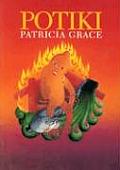 Potiki is a broken story about a broken people, or so you might guess from the first 20 or so pages of the novel. The narrative jumps from person to person and across time. Many of the main characters are disabled in one way or another, and the community they belong to is dying out. Not exactly the happy reading one usually hopes for in the get-away-from-the-world fictional stuff we tend to read for enjoyment. To argue for the other side, maybe reading about others’ problems and how they deal with them is a good way to get away from our own life issues. And that’s my argument for why this novel ultimately is a happy one, despite its brokenness—Potiki leaves you hopeful, both for the future of the characters and for your own future. If they can face the future, so can we, right?
Potiki is a broken story about a broken people, or so you might guess from the first 20 or so pages of the novel. The narrative jumps from person to person and across time. Many of the main characters are disabled in one way or another, and the community they belong to is dying out. Not exactly the happy reading one usually hopes for in the get-away-from-the-world fictional stuff we tend to read for enjoyment. To argue for the other side, maybe reading about others’ problems and how they deal with them is a good way to get away from our own life issues. And that’s my argument for why this novel ultimately is a happy one, despite its brokenness—Potiki leaves you hopeful, both for the future of the characters and for your own future. If they can face the future, so can we, right?
The novel is narrated by a woman named Roimata and her adopted son, Toko, but it also jumps to third-person omniscient to get into the heads of several other of the main characters. This crazy narration spirals you through the story of Roimata and Toko’s people, a Maori tribe living on the New Zealand coastline in the early Eighties. Like all marginalized cultures, the Maori have struggled for the past two centuries to keep their identity in an ever-changing, unsympathetic world. In Potiki, we see a tribe’s struggle with this first-hand. Many members of the community have lost their jobs, including Roimata’s husband Hemi. Hemi decides the family needs to go back to the land; that farming is the only way their people will survive both starvation and a culture change. Attempts to hamper them come in the form of the “Dollarmen,” people trying to buy land from the tribe to build a water park. The community must fight to keep their land out of the hands of those who would see it ruined.
Amidst this is the story of Toko, a malformed boy born to Mary, the mentally disabled sister of Hemi. Despite his disabilities, the novel compares Toko to the god Maui (if you know your Pacific Island mythology) as Toko inadvertently performs several of the feats Maui is said to have performed—a comparison enhanced by Toko’s prescience and ability to read people. Though the novel focuses on the life of the community, it is Toko’s life that pushes the story forward.
I would say that Toko’s birth and death bookend the story, but Maori tradition dictates that tales aren’t linear, but rather spiral in nature—cyclical in that the same events happen time and again, but each time on a different level, if that makes any sense (BSG fans should understand this idea). If you pay attention, you’ll note that Roimata mentions spirals several times throughout the novel.
I won’t say much else about the novel, except to note that if you’re looking for a different kind of story to read, this is a good one. It covers myth, the struggle against the Man, and a loving community. Although somewhat disjointed, the narrative does somehow manage to mesh into a cohesive tale, with Toko as the glue. One of my favorite tales, I highly recommend this colorful novel to anyone searching for something out of the ordinary.
Rating: 9.5 out of 10 stars